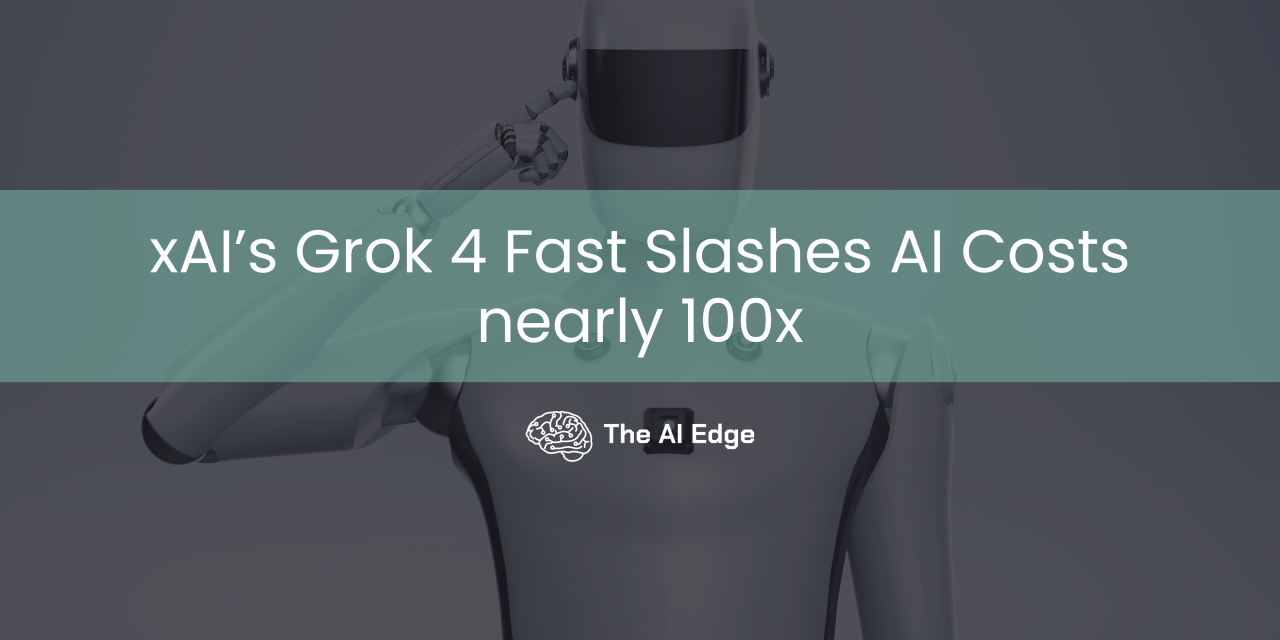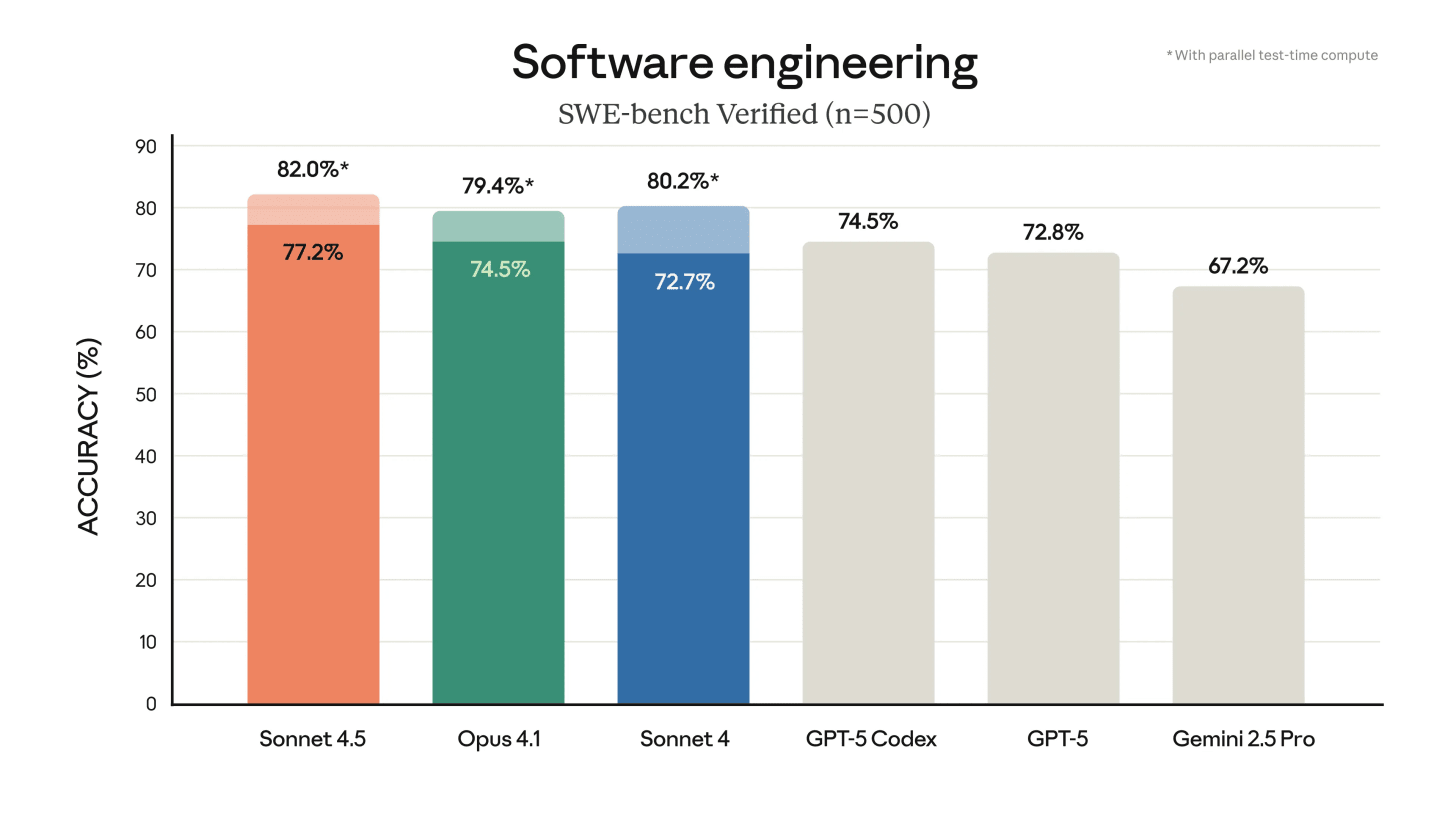Hello Engineering Leaders and AI Enthusiasts!
This newsletter brings you the latest AI updates in a crisp manner! Dive in for a quick recap of everything important that happened around AI in the past two weeks.
And a huge shoutout to our amazing readers. We appreciate you😊
In today’s edition:
🚀 xAI debuts ultra-efficient Grok 4 Fast
👨🏻💻 Anthropic launches “best coding model” yet
🌊 Alibaba drops multimodal AI wave
💻 OpenAI unveils GPT-5 Codex for coding
📊 Google’s DORA report flags AI trust gap
🔎 OpenAI & Anthropic reveal AI habits
💡 Knowledge Nugget: Time Traveling Your AI Context by Colin Plamondon
Let’s go!
xAI debuts ultra-efficient Grok 4 Fast
xAI has introduced Grok 4 Fast, a new reasoning model designed for efficiency, delivering near-frontier performance at a fraction of the cost. By cutting token usage by 40%, the model achieves a 98% reduction in price while still matching or surpassing Grok 4 on math, science, and coding benchmarks.
Notably, Grok 4 Fast outperformed Claude 4.1 Opus and Gemini 2.5 Pro in head-to-head tests and took the top spot in LMArena’s Search Arena. With support for a 2M token context and native tool integrations for browsing and code execution, it offers speed and scale at levels rarely seen in this tier.
Why does this matter?
xAI’s Grok 4 Fast pushes the boundaries of efficiency, cutting costs by nearly 100×. This is the kind of breakthrough that makes Sam Altman’s vision of “intelligence too cheap to meter” feel less like hype and more like an imminent reality.
Anthropic launches “best coding model” yet
Anthropic has launched Claude Sonnet 4.5, a major upgrade positioned as the best coding model in the world. The release delivers state-of-the-art results on SWE-bench Verified, improves computer use tasks by nearly 20% over Opus 4.1, and demonstrates autonomous coding sessions lasting over 30 hours, generating 11,000 lines of code.
Alongside benchmark performance, Sonnet 4.5 brings new tools like Claude Code checkpoints, memory and context editing for the API, and a Claude Agent SDK. Anthropic also introduced “Imagine with Claude,” a short-term preview showcasing real-time software generation for Max users.
Why does it matter?
After OpenAI’s Codex threatened to steal the spotlight, Anthropic hit back with Sonnet 4.5. The battle for “best coding model” is heating up, and this back-and-forth is accelerating progress across the entire developer ecosystem.
Alibaba drops multimodal AI wave
Alibaba has dropped a wave of Qwen3 models, unveiling six variants that push across text, vision, audio, translation, and safety. The headline launch is Qwen-Max, a trillion-parameter model showing near-frontier performance in coding and agentic tasks, with its Heavy version acing math reasoning benchmarks.
Other standouts include Qwen-Omni, a multimodal system spanning text, images, audio, and video with multilingual speech capabilities, and Qwen-VL, which outpaces top visual models on several benchmarks. Alibaba also rolled out LiveTranslate-Flash for real-time interpretation, Guard safety models, and upgraded Coders, marking one of the most expansive single-week AI drops yet.
Why does it matter?
While U.S. labs drip-feed frontier models, Alibaba is taking the opposite route, flooding the market with a full stack of near-frontier options across text, vision, and multimodal. Qwen3 positions Alibaba closer to the global frontier than any Chinese release since DeepSeek’s R1.
OpenAI unveils GPT-5 Codex for coding
OpenAI has launched GPT-5 Codex, a next-gen agentic coding model designed to scale its compute effort depending on task complexity. Simple bug fixes take seconds with 94% fewer tokens, while larger challenges like refactoring can run autonomously for hours, achieving a 51.3% success rate compared to 33.9% for GPT-5.
Beyond speed and efficiency, GPT-5 Codex introduces full code review capabilities, scanning codebases, running tests, and validating dependencies to catch critical bugs. The rollout also includes updated CLI tools, IDE extensions, and seamless local-to-cloud handoffs, positioning it as a serious upgrade for professional developers.
Why does it matter?
Codex positions OpenAI to go toe-to-toe with Anthropic in the coding arena, showing that adaptability, not just raw power, may define the next stage of the competition.
Google’s DORA report flags AI trust gap
Google’s DORA 2025 report finds 90% of developers now use AI assistants daily, spending nearly two hours with them on average. While most cite productivity and code quality gains, a notable trust gap remains, with 30% admitting little or no confidence in AI outputs, even as they continue integrating the tools into workflows.
Google has also introduced the DORA AI Capabilities Model, outlining seven practices for organizations to structure and scale their AI use responsibly. The model aims to help teams turn widespread experimentation into measurable, long-term engineering outcomes.
Why does it matter?
AI assistants are now embedded in daily dev workflows but trust still lags. The gap highlights a balance: big productivity wins, but human judgment remains the final safeguard for quality.
OpenAI & Anthropic reveal AI habits
OpenAI and Anthropic have shared new insights into how users engage with ChatGPT and Claude, showing clear splits in use cases, geography, and intent. Claude users lean toward coding, while ChatGPT is used more for writing, advice, and decision support, with personal use growing rapidly, rising from 53% to 73% in less than a year.
The reports also highlight a global divide: ChatGPT adoption is accelerating 4× faster in low- and middle-income countries, while Claude remains more concentrated in wealthier regions. Across both platforms, users are increasingly delegating tasks and using AI as a tool for information-seeking.
Why does it matter?
Regional and platform divides show there’s no “one-size-fits-all” AI assistant. That means the race isn’t just about raw model performance, it’s about who can fit different budgets and markets..
Enjoying the latest AI updates?
Refer your pals to subscribe to our newsletter and get exclusive access to 400+ game-changing AI tools.
When you use the referral link above or the “Share” button on any post, you’ll get the credit for any new subscribers. All you need to do is send the link via text or email, or share it on social media with friends.
Knowledge Nugget: Time Traveling Your AI Context
In this piece, Colin Plamondon explains why constantly re-rolling AI outputs is a trap. When you hit “try again” without fixing the input, you may get a better answer by chance, but you also leave behind poor outputs that pollute the thread and bias future responses.
Expert users take a different approach: they edit the original prompt, refine missing context, and “time-travel” their lessons back to the start of the conversation. This not only corrects the immediate mistake but also steadily trains the thread toward better results.
Beyond fixing one-off errors, this method creates lasting assets called “context blobs.” These are curated snippets of writing styles, preferences, or project details that can be carried across threads.
Why does it matter?
Learning to manage context is becoming a core skill for working with AI. As systems move toward longer memory and persistent personalization, the way we structure inputs today could shape how effectively we collaborate with AI tomorrow.
What Else Is Happening❗
📰 OpenAI debuts ChatGPT Pulse, a $200/mo Pro feature that auto-generates daily AI briefings from your chats, Gmail, and Calendar.
🍏 Apple is testing “Veritas,” an internal chatbot stress-testing new AI for Siri after delays pushed its upgrade to 2026.
💸 Nvidia to invest up to $100B in OpenAI, deploying 10 GW of GPU systems to build the largest AI infrastructure project in history.
🧬 Stanford & Arc Institute used AI to design new synthetic viruses that killed bacteria, with 16 lab-tested successes showing mutations never seen in nature.
📹 YouTube rolled out 30+ new creator tools, adding AI editing, auto-dubbing with lip sync in 20 languages, Shorts auto-clipping, and free Veo 3 Fast video gen.
💳 Google unveiled the Agent Payments Protocol, backed by 60+ firms, to let AI agents securely make purchases with support for cards, banks, and stablecoins.
🎨 Reve launched a free all-in-one image platform with AI generation, natural language edits, and drag-and-drop controls, plus beta API access for developers.
🧬 Harvard researchers released PDGrapher, a free AI tool that maps gene–drug combos to restore diseased cells, showing 35% better accuracy across 19 cancers.
New to the newsletter?
The AI Edge keeps engineering leaders & AI enthusiasts like you on the cutting edge of AI. From machine learning to ChatGPT to generative AI and large language models, we break down the latest AI developments and how you can apply them in your work.
Thanks for reading, and see you next week! 😊
Read More in The AI Edge





